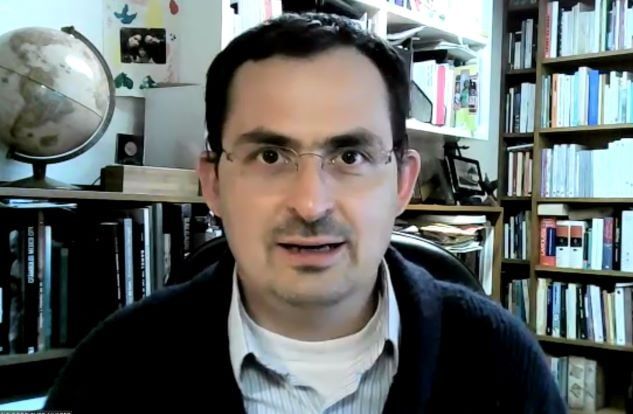Urgent need to curb SARS-CoV-2 transmission
The more cases, the greater the risk of new or stronger variants. Vaccines are essential to prevent severe disease. It is estimated that half of the world's population will come into contact with the omicron variant.

Mauricio Rodríguez Álvarez, spokesman for the University Commission for the Attention of the Coronavirus Emergency of the UNAM, stated that it is urgent to advance in the vaccination against SARS-CoV-2 and to limit high-risk social coexistence -meeting several people from different homes in closed places without protection- to break the chain of contagion.
Since the fourth wave of COVID-19 in Mexico coincides with the booster period, if a person has had the disease and recovered, it is possible to receive the booster. The only contraindications for vaccination are to have symptoms of the disease or a history of a strong allergy to the biologic for which hospitalization would have been required.
"If you are within 10 days of the onset of the disease and you no longer have any symptoms, you are out of that acute stage, it may be better to get vaccinated, otherwise the vaccination will be delayed and, likely, you will not find a place to get vaccinated later," recommended the professor of the Department of Microbiology and Parasitology of the Faculty of Medicine of the UNAM.
In some places, such as Mexico City, the biologic is more accessible, although in other regions this is not the case. It is also important to avoid putting obstacles in the way of immunization, as this could cause delays in receiving regular and booster doses. Because the omicron variant could cause numerous cases in a short period, it is estimated that half of the world's population could come into contact with the virus in the course of the next few weeks.
The academic detailed that it is important to make the distinction between becoming infected - coming into contact with the SARS-CoV-2 virus - and getting sick, that is, having signs and symptoms of COVID-19. "The virus can arrive in low numbers and not cause symptomatic illness. It is also possible for it to arrive and, because you are vaccinated, cause much milder symptomatology that you may not realize since your symptoms will be mild and you will recover more quickly," he said.
Regarding vaccines, he assured that people are protected from serious disease if they have their complete primary scheme -either with one or two doses of biologics- and a booster. "That is fine, it will help, it is safe and effective". Although in other countries a fourth or even a fifth dose is being considered, Rodríguez Álvarez stressed that it is with the correct use of a mouth cover that more contagions can be prevented, because vaccines do not prevent them completely.
Although the omicron variant is not generating serious diseases in most cases, the scenario is not good because the growing number of sick people in a short period may also increase the need for medical services (consultations and diagnosis), besides causing the inadequate use of antibiotics and other partially harmful drugs. "In the event of a rapid increase in the number of patients requiring hospitalization, hospital reconversion will be needed again, which will generate a very significant burden on the system and health personnel," he warned.
The more cases of COVID-19 there are, the greater the risk of new or stronger variants being generated. It is not yet clear whether omicron will leave fewer sequelae in the sick, so it is not advisable to have so many cases, he emphasized.

Limiting gatherings
Rodríguez Álvarez indicated that it is important to stop the transmission of the SARS-CoV-2 virus and break the cycle of rapid increases in the number of cases caused by the intense coexistence during Christmas season. To do so, it is necessary to limit the social interrelation of risk, especially on weekends when Mexican families are used to meeting at home with many people from different homes and without general care.
Vaccinations are fundamental to prevent serious disease, while the use of masks, ventilation of closed spaces, healthy distance, and avoiding crowds are key to prevent contagion.
"It should be reiterated that the best mask is the one that is used and well: that covers the nose and mouth, on the sides, and that is not being handled. If it is made of cloth, it should have three layers and if it is one of the high-efficiency ones -that have numbers and letters in their name-, they should be intact, clean, not have been used for a long time and be used properly". If double covers are used, the best quality one should be placed first, and the additional one on top.
"It is essential that we use masks in all activities because many people will start to come out of the disease -after five or seven days of being sick- to return to their work and we all need to be protected in the public space so that social activities can continue to take place without major problems," he remarked. The UNAM expert also explained that the consumption of vitamins and food supplements has marginal benefits when they are taken without control, without being prescribed by a doctor, and without a diagnosis of any nutritional alteration.
"We should not have false sensations of protection with them, because so far it has not been proven that they are useful to avoid COVID-19," insisted Rodríguez Álvarez. The ideal is to maintain a balanced diet that includes fruits, vegetables, animal and vegetable proteins, vegetable and animal fats, as well as water.
"By ingesting vitamins or additional nutritional compounds, the kidneys and liver can be forced a little to process all that which is being taken in excess. An example is vitamin C: the daily requirement is less than 100 milligrams, and if we ingest an effervescent tablet of one gram -one thousand milligrams-, we exceed by far the daily requirement and the rest is eliminated through urine", commented the university specialist.




